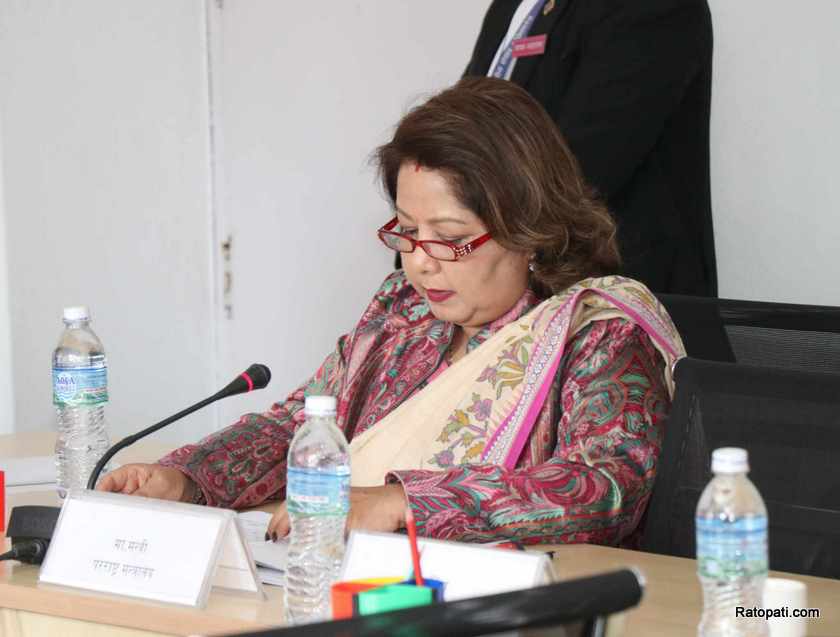It is not possible to resolve teachers' demands in the budget session: Speaker
We use Google Cloud Translation Services. Google requires we provide the following disclaimer relating to use of this service:
This service may contain translations powered by Google. Google disclaims all warranties related to the translations, expressed or implied, including any warranties of accuracy, reliability, and any implied warranties of merchantability, fitness for a particular purpose, and noninfringement.
Kathmandu. Speaker Devraj Ghimire has said that it is not possible to address the demands of teachers in the budget session. During a conversation with a representative of News Agency Nepal in Jhapa on Wednesday, Speaker Ghimire said that it is not possible to address the demands of teachers as budget-related issues should be given more priority in the budget session.
He said that it is not possible to finalize the education bill in the budget session and move on to another topic. He said that the budget session should give priority to budget-related issues.
Meanwhile, the government has called a budget session for Baisakh 12, giving priority to the demands of teachers. It has also urged teachers to engage in negotiations. However, the Teachers' Federation has announced that a credible basis for the promulgation of the act has not been created and has urged teachers across the country to attend their homes and to show up and strengthen the movement.
Speaker of the House of Representatives Devraj Ghimire says that even if the teachers do not engage in negotiations since the government has started the process of addressing their demands, they should immediately withdraw their movement. He says that it is not possible to promulgate the School Education Act immediately as the teachers have demanded. According to Ghimire, the education bill will not be a priority in the budget session starting from Baisakh 12.
He said, "It is not possible for the session that has been called now to immediately put the education bill on the number one item and move on to another issue. Because the budget session should give priority to issues related to the budget. Because the budget should be presented by Jestha 14 and passed by mid-Asar. There is a compulsion to work within the limits of the legal process. He said that the budget session has been called a little early keeping the education bill in mind."
Federal laws are necessary for the implementation of federalism. Especially in the absence of federal laws on education, civil service and police, there are problems in implementing federalism at the provincial and local levels. However, Speaker Ghimire says that even though bills on education, civil service and police are brought with priority, there are obstacles due to differences between political parties.
He said that the problem has arisen because the bill should be brought based on the agreement between the government and teachers regarding the education bill. He said that there are about 1,800 amendments to the education bill being discussed in the education subcommittee. No action has been taken on the bill immediately as there are differences among the political parties that an agreement should be reached to finalize it.
Speaker Ghimire says, ‘Although there was an attempt to finalize the education bill in the last winter session, discussions could not be held in the subcommittee for about a month due to the ill health of the education minister.’
Speaker Ghimire says that the demands of the teachers are also not clear. He says that the teachers have said that they want an act, but since it is the job of the government and parliament to make an act, it is not possible immediately as they said. Ghimire said that it is irresponsible for teachers to say that they will not sit in on the talks when the government has already called a session of parliament to make an act.
He said, ‘It is one thing to draw the government’s attention with demands, but it is not a good thing to say that they will not sit in on the talks. An environment for talks should have been created.’
The stubbornness of the teachers who will not stop the agitation until the education act is promulgated also does not seem logical. Because the bill for the education act must reach parliament. The lawmakers must pass the bill. For the bill to reach the parliament, the relevant committee must discuss it and send it to the parliament. According to Speaker Ghimire, the education subcommittee has until Baisakh 25 to discuss the bill and send it to the committee. After that, discussions will also take place in the committee.
The committee will pass the bill and send it to the parliament. Again, the government's policies and programs will be given priority through discussions in the budget session. In this regard, it seems that the bill will not be passed and become an act even after the month of Jestha. In that case, will the teachers remain in protest for two months? The question mark has arisen as to what will happen if no middle ground is found between the government and the agitating teachers.
Speaker Ghimire says that such demands are not justified as the teachers' demands are such that they will burden the state financially on various topics including salary increase and grade increase.
"It is not reasonable to make such demands that go against the constitution that the state cannot afford," said Speaker Ghimire - but still, the problem can be solved through dialogue. The law will come between the country's education system and the economy, teachers have understood.
According to Speaker Ghimire, even if the government says it will address the demands, it is not in a position to fulfill the demands of the teachers in the same way. 'It is not right to protest and say that we will not sit in talks while the government is trying to fulfill the demands,' said Speaker Ghimire.
The protesting teachers have been protesting for 15 days, demanding the promulgation of the School Education Act. The protest has been going on in Maitighar Mandal, Kathmandu, under the leadership of the Nepal Teachers Federation National Working Committee since Chaitra 20.
After the government showed no interest in their peaceful demands for a week, the teachers have intensified the protest by going on an academic strike since Chaitra 26. During the protest, the government and the Teachers Federation have held talks twice. Even though the government requested for talks the last time, the teachers are active in the protest, saying that they will not sit in talks until the act is promulgated. —News Agency Nepal






Leave Comment